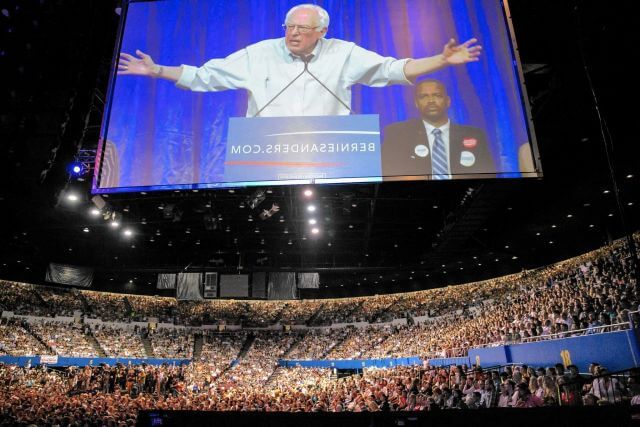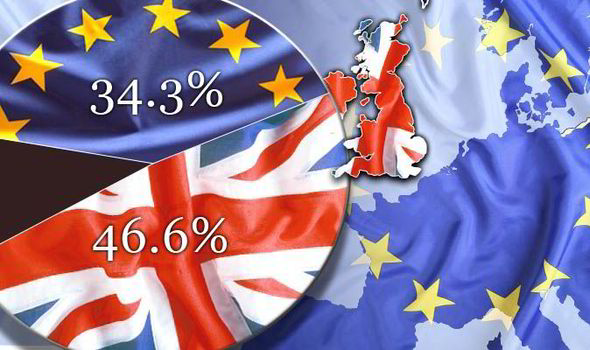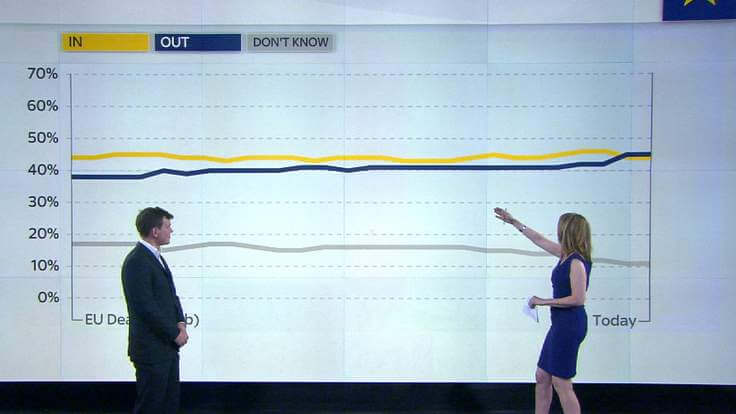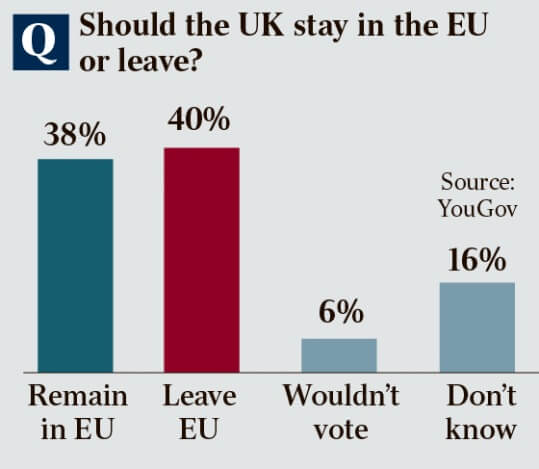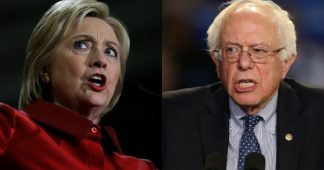A friend of “Defend Democracy Press” has forwarded us this article by Mr. Nielson, whom we don’t know and whose credibility we can’t judge.
We cannot know if there are any possibilities for rigging the British vote.
Still, we believe he advances some arguments which we believe it is better for all of us to take some time to think about them. This is why we post it
The Brexit Vote Will Be Rigged – Jeff Nielson
June 16, 2016
How important is the upcoming “Brexit” vote in the UK? In a recent commentary , it was noted that the current leader in French polling to become France’s next president is Marine Le Pen, of Front-National. Ms. Le Pen has already dubbed herself “Madame Frexit”, going back to the time of the “crisis” in Greece.
Given that the UK has never been fully “in” the European Union, a British vote to leave the EU would not, by itself, be a fatal blow for this fascist entity. But the effect of a Brexit vote on France would be twofold. First, it would undoubtedly provide a further boost in popularity for Ms. Le Pen. Secondly, it would strengthen the resolve toward Frexit among the large majority in France who already have an unfavorable opinion of the EU.
The numbers above, cited in an article by Mike Shedlock, paint a clear picture. In only one of the European Union’s founding members (Italy) do we see anything resembling a “strong majority” when it comes to supporting EU membership. Apart from two EU newcomers – Poland and Hungary – we see European populations which are either evenly split in terms of support for the European Union, or (like Greece) are strongly opposed to this political union.
A successful Frexit would undoubtedly trigger a wave of nationalism across Europe, and lead to further, fatal defections in this made-for-the-bankers political hierarchy. Thus in the eyes of the Big Bank crime syndicate, Frexit must be prevented, at any/all costs. Since a successful Brexit would greatly increase the odds of Frexit, it too must be prevented, at any/all costs.
This brings us to the title for this commentary. Alleging the “rigging” of any election is still considered to be a very serious charge in the minds of most Western inhabitants, because the majority of these inhabitants still cling to the myth that we have a political system which provides some bastardized version of “democracy”. What evidence is there to support allegations that the One Bank’s oligarch proprietors arealready rigging Western elections? The best kind: statistical evidence.
This evidence comes in the form of election polling. Here readers need to understand that political polling is a science. There is a very specific set of parameters which are used in gathering the data. The results released by the polling agencies are precise, statistical representations of that data.
Because the “data” involves only a sample of the electorate, there is a margin of error in such polling. That margin of error is also the result of precise, statistical calculations. Because the data involves the voting inclinations of human beings, this produces a second margin of error, known as “the confidence interval.” This is the possibility of an anomalous result, meaning something outside of the margin of error attributable to the mere size of the sample.
This confidence interval is also the product of a precise, statistical calculation. Typically, statisticians calculate a “95% confidence interval” as the level of certainty they seek to achieve in their polling. In other words, 95% of the time (19 times out of 20) the actual election result would fall within the specified margin of error, if voting occurred at that moment.
In aggregate terms, this means that polling agencies are able to “call” elections (within their margin of error) 95% of the time. Decades of practice in such polling has only improved upon the accuracy of this science. In the media, what we saw was a steady trend to announce election “victories” earlier and earlier on ballot night, based in large part upon the consistent degree of accuracy of pre-election polling, and the tendency for those poll results to be reflected in the early hours of tabulating voting.
Then, a few years ago, suddenly everything changed. Popping up in different spots, across the Western world, we began to see an increase in what were more than mere, anomalous results (i.e. elections which “defied the polls”). We suddenly began to see significant numbers of outrageous anomalies. Here we are not talking about election results which were merely slightly outside the margin-of-error boundaries of the polling, but rather results which were virtually opposite to these scientific polls.
For those seeking specific examples, let’s start with the domicile of this writer: the Province of British Columbia. In the last provincial election here (May 2013), the election result was supposed to be a foregone conclusion: a victory for the New Democratic Party.
[Liberal victor, Christy] Clark started the campaign as the clear underdog in the poll, trailing by 20 points.
However, the final result was something much different:
Not only did Clark defy countless polls predicting her defeat , she increased her party’s majority in the legislature by five seats and became the first woman to be elected premier in a general election in B.C . [emphasis mine]
Countless polls predicting her defeat . Admittedly, the NDP lead in the polls shrank from the original, enormous 20-point margin. However, that was to be expected, as even among a polarized electorate we rarely ever see such an extreme margin of victory in the final result. What is of significance in this rigged election is that throughout the political campaign, “countless polls” from several, different polling agencies mathematically predicted Clark’s defeat. Not a single poll result, at any time in the election indicated even the possibility of a Liberal majority victory.
This was not merely an anomalous result, outside of the confidence interval of the polling. It is was an outrageous anomaly – i.e. an impossible anomaly. It was a rigged election. For Canadian readers unimpressed with this single example, how about our last federal election (October 2015)?
As the campaign began, political polls showed the election as “a three-horse race” , too close to call. Toward the end of the election, support for the NDP faded somewhat, leading to polling agencies calling it a two-horse race , but still too-close-to-call.
The NDP, historically Canada’s most socially progressive party, had looked federally electable for the first time ever, buoyed by the Alberta win and a shift away from the far-left policies that had previously alienated voters.
But it has failed to distinguish itself from fellow center-left party the Liberals as the best alternative to the nine-year government of Conservative Prime Minster Stephen Harper.
As all Canadians know, the actual result was a Liberal landslide majority. Once again, we are not dealing with a mere “anomaly” outside the confidence interval. We are dealing with another outrageous anomaly, an election result which according to all the polls, from all the polling agencies, over the entire duration of the campaign, was not even possible.
Are we to believe that (at least in Canada) polling agencies have suddenly abandoned their scientific methodology, or become too inept to follow that methodology? Or, has the Canadian voter (for no reason) turned into a politically capricious beast, whose electoral whims have suddenly become completely unpredictable?
We don’t have to even bother asking the mainstream media for its opinion. We see these sorts of suspicious anomalies across all facets of our lives. Whenever something makes absolutely no sense, and/or cannot be explained, we’re always told the same thing: it’s “the New Normal” – meaning there is no (legitimate) explanation.
There is no explanation for these Canadian political anomalies, in back-to-back election results (for all residents of this province). But this is far from being just a made-in-Canada form of Western corruption. For those readers who doubt that the Brexit vote can/will be rigged, just look at the UK’s last national election (May 2015). In that election, we saw a virtual carbon-copy of what occurred in Canada’s most-recent national election.
After months of election projections showing the main parties deadlocked in a neck-and-neck finish, the final poll said something utterly different: British voters [supposedly] want Conservative rule . [emphasis mine]
“Utterly different” than all of the campaign polling. Not just outside the margin of error. Not remotely close to the margin of error, of any of the polling, at any time in the campaign. The subtitle of the article containing the excerpt above summarizes yet another rigged election in the realm of Western politics:
Britain’s Conservatives win big, beating no one more than the pollsters and election experts.
In the real world, politicians can’t “beat” pollsters, because political polling agencies do not compete against politicians. They are impartial observers (at least, the respected ones). They get paid just as much for their work no matter who they announce as leading a political race, or how large or small the margin. There is no rational explanation for the sudden appearance of all these extreme political anomalies, where (in every case) an Establishment candidate has emerged victorious – and with a “majority” mandate.
Of course if the oligarchs continue rigging elections to such an extreme degree as to obviously “defy the polls”, reasonable people will begin to get suspicious. Thus, as Brexit nears, we see the oligarchs attempting a new tactic: falsifying political polls. Last week ; three, separate UK polls were released on the Brexit campaign. All three polls showed a statistically significant majority in favor of “leaving” (the European Union). Just one day later; the Corporate mediacame out with this headline.
Fresh polls show Brexit vote swinging back to ‘remain’
Imagine that! Just 24 hours after several independent polls showed a significant majority in favor of Brexit, we’re told that there are two “new polls” which show British voters flip-flopping in their support. Or are there?
A Daily Telegraph/ORB poll published late Monday put support for retaining EU membership at 48%, versus 47% for those wanting a Brexit, among those who intend to vote.
Meanwhile, a Times/YouGov poll out Monday found 43% of respondents planning to vote to stay, while 42% support a departure, and 11% are “don’t know.”
The first observation of note here is that neither of these political polls are statistically significant, in contrast to the three polls (showing the opposite result) the preceding day. For those readers unfamiliar with statistical terminology, a brief explanation is warranted.
As previously noted, all polling (of any kind) has a margin of error attached to it, typically somewhere around 3%. Thus any poll result which reports a difference which is less than the margin of error is not “statistically significant”. Instead, it is mere statistical noise, where the polling provides no clear indication of a leader.
The three polls released on June 6th all indicated majority support for Brexit, and all were statistically significant. With the two polls released on June 7 th, which supposedly showed support to “remain”, both were just razor-thin 1% margins, and thus neither result was statistically significant. Yet the Corporate media reported the “noise” on equal terms with the actual statistically decisive polls from the previous day. Note also that both of the polls which showed supposed support to remain in the EU were manufactured by known mouthpieces of the Establishment: the Daily Telegraph and the London Times.
Then there is the math. If only one poll had been released on June 6 th showing significant support for Brexit, the possibility of two polls coming out the next day where both (supposedly) indicated even an indecisive outcome would have been less than 25%. However, given that threepolls from June 6 th all showed significant support for Brexit, the possibility of two polls coming out the next day supposedly showing an indecisive outcome is somewhere well below 10% .
In other words, the two polls from June 7th were extreme anomalies – poll results which were so improbable as to raise immediate suspicion in the minds of those with statistical inclinations. We know the oligarchs have rigged elections. We know they intend to rig the Brexit vote (just like they rigged the UK’s last, national election). Now they appear to be rigging the political polls, as well.
If our elections are now rigged, and the political polls involving these elections are now being rigged as well, then the phrase “Western democracy” has clearly descended to the level of an oxymoron.
